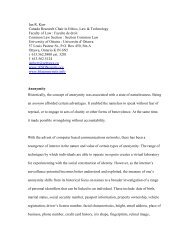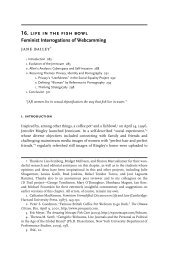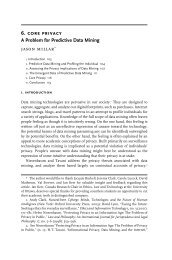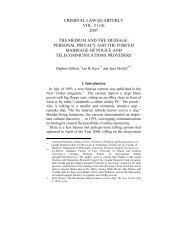Complete Cases Chart - Supreme Court of Canada - On the Identity ...
Complete Cases Chart - Supreme Court of Canada - On the Identity ...
Complete Cases Chart - Supreme Court of Canada - On the Identity ...
You also want an ePaper? Increase the reach of your titles
YUMPU automatically turns print PDFs into web optimized ePapers that Google loves.
Case Name (<strong>Court</strong>)<br />
(Judge)<br />
Location/Method <strong>of</strong> Search Relevant Statutes Issues/Holdings<br />
- (1) whe<strong>the</strong>r <strong>the</strong> search violates s. 8 <strong>of</strong> <strong>the</strong>C<strong>Chart</strong>er? - Y/N<br />
- (2) whe<strong>the</strong>r to exclude evidence by s. 24(2)? – Y/N<br />
Reasoning<br />
- (1) relevant to s.8 + CASES (Kokesch, Plant, Hunter, Tessling, Edwards)<br />
- (2) relevant to 24(2) + CASES (Collins)<br />
-With regard to good faith, <strong>the</strong> police claimed to have had an honest and reasonable<br />
belief that <strong>the</strong> search was lawful.<br />
- As to whe<strong>the</strong>r <strong>the</strong> misunderstanding was reasonable, because <strong>the</strong> law is settled and<br />
has been on <strong>the</strong> books for 8 years, ignorance <strong>of</strong> <strong>the</strong> law cannot be accepted.<br />
- Following “Justice Sopinka in R. v. Kokesch, ei<strong>the</strong>r <strong>the</strong> police knew or ought to<br />
have known <strong>the</strong> law with respect to a vehicle search that is incidental to an arrest.<br />
Clearly <strong>the</strong> police ought to have known.” (para. 31)<br />
- Consequently <strong>the</strong> police did not act in good faith and evidence is generally<br />
excluded in such circumstances. An additional factor is to instil in law enforcement<br />
<strong>of</strong>ficers and <strong>the</strong>ir advisors <strong>the</strong> need to be vigilant regarding <strong>the</strong> extent <strong>of</strong> <strong>the</strong>ir lawful<br />
authority. (There appeared to be a concern that admitting <strong>the</strong> evidence negatively<br />
influence police conduct in <strong>the</strong> future). <strong>On</strong> balance, <strong>the</strong> administration <strong>of</strong> justice<br />
would be brought into disrepute if <strong>the</strong> evidence were admitted.<br />
R. v. Kelly<br />
1999 CanLII 13120<br />
(NB C.A.)<br />
Drapeau J.A.;<br />
Turnbull and Larlee<br />
JJ.A. (con).<br />
* Final Level<br />
- The police conducted an<br />
unwarranted aerial search by<br />
helicopter <strong>of</strong> <strong>the</strong> accused’s<br />
garden followed by an<br />
unwarranted search on <strong>the</strong><br />
ground. They <strong>the</strong>n seized<br />
uprooted marijuana plants.<br />
- <strong>Chart</strong>er, s.8. - (1) Did <strong>the</strong> searches and seizure violate s.8<br />
<strong>of</strong> <strong>the</strong> <strong>Chart</strong>er?<br />
• YES<br />
- (2) Should <strong>the</strong> evidence be excluded?<br />
• NO<br />
- Ref. to Plant (core biographical information).<br />
- Ref to Kokesch (boundaries <strong>of</strong> a perimeter search).<br />
- (1) The open space adjoining <strong>the</strong> house (<strong>the</strong> accused’s garden) was subject to a<br />
reasonable expectation <strong>of</strong> privacy as a ‘curtilage’ <strong>of</strong> <strong>the</strong> dwelling (and not part <strong>of</strong> <strong>the</strong><br />
‘open fields’ doctrine).<br />
• “As a rule, lawful occupants have an expectation <strong>of</strong> privacy in all open spaces<br />
within <strong>the</strong>ir residential lots that is qualitatively sufficent to invest <strong>the</strong>m with s.8<br />
protection against unlawful aerial as well as terrestrial searches.” (para. 50).<br />
• The subsequent on-<strong>the</strong>-ground search was a direct result <strong>of</strong> <strong>the</strong> arial search. The<br />
unlawfulness <strong>of</strong> <strong>the</strong> first search taints <strong>the</strong> second and makes it unreasonable.<br />
Surveillance –<br />
aerial search<br />
- (2) The evidence was non-conscriptive and its admission would not render <strong>the</strong> trial<br />
unfair.<br />
• The factors in favour <strong>of</strong> exclusion (importance <strong>of</strong> rights and manner <strong>of</strong><br />
intrusion) are mitigated by <strong>the</strong> fact that: (a) <strong>the</strong> accused was not <strong>the</strong>re at time <strong>of</strong><br />
search; (b) <strong>the</strong> search did not involve <strong>the</strong> residence as such; (c) <strong>the</strong> accused<br />
subsequently consented to a search; (d) <strong>the</strong> evidence was real and without it<br />
<strong>the</strong>re would be no conviction; and (e) <strong>the</strong> accused is a peace <strong>of</strong>ficer (prison<br />
guard).<br />
• The searches were not a product <strong>of</strong> deliberate and reckless disregard <strong>of</strong> rights.<br />
R. v. Leaver<br />
1998 CanLII 12205<br />
- Police recorded a<br />
conversation between <strong>the</strong><br />
accused and a police<br />
- Criminal Code, s.183;<br />
-<strong>Chart</strong>er, s.8.<br />
- (1) Was <strong>the</strong> recorded conversation<br />
admissible?<br />
- Ref. to Edwards (totality <strong>of</strong> circumstances).<br />
- Ref. to Kokesch (boundaries <strong>of</strong> a perimeter search).<br />
- (1) The accused knew he was speaking with a police negotiator and in <strong>the</strong>se<br />
circumstances could not have any reasonable expectation <strong>of</strong> privacy in <strong>the</strong> sense<br />
that it was a private conversation under s. 183 <strong>of</strong> Criminal Code.<br />
51







